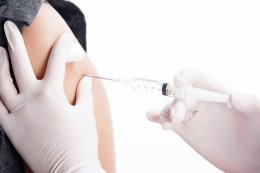 In late 2018, the U.S. Food and Drug Administration (FDA) announced expanded approval of the Gardasil 9 human papilloma virus (HPV) vaccine. Previously approved for administration to males and females between the ages of 9 and 26, Gardasil 9 is now an approved HPV vaccine for men and women through 45 years of age.
In late 2018, the U.S. Food and Drug Administration (FDA) announced expanded approval of the Gardasil 9 human papilloma virus (HPV) vaccine. Previously approved for administration to males and females between the ages of 9 and 26, Gardasil 9 is now an approved HPV vaccine for men and women through 45 years of age.
According to the FDA’s press release:
“[The] approval represents an important opportunity to help prevent HPV-related diseases and cancers in a broader age range. . . . The Centers for Disease Control and Prevention has stated that HPV vaccination prior to becoming infected with the HPV types covered by the vaccine has the potential to prevent more than 90 percent of these cancers, or 31,200 cases every year, from ever developing.”
The FDA first approved Gardasil 9 in 2014 for the prevention of certain cancers and other diseases caused by HPV. At the time of approval, Gardasil 9 replaced the original Gardasil, which had been in use in the United States since 2006. The FDA based its expanded approval of Gardasil 9, in part, on the overall effectiveness rating of the original Gardasil (“since the vaccines are manufactured similarly and cover four of the same HPV types”), which was approximately 88 percent.
About Gardasil 9
1. Recommended Vaccination Schedule
The Centers for Disease Control and Prevention (CDC) recommend vaccination against HPV using Gardasil 9 between the ages of 11 and 12. Children up to 14 years of age can be fully immunized with a two-dose series, with the doses administered six to 12 months apart. For adolescents age 15 years and older and adults, the CDC recommends a three-dose series, with a minimum of four weeks between the first two doses and a minimum of 12 weeks between the second and third.
2. Protection Against HPV
Vaccination with Gardasil 9 provides protection against human papilloma virus (HPV). HPV is a virus that causes genital wards in males and females and is the primary cause of cervical cancer in women. According to the CDC, despite the wide availability of Gardasil 9, approximately 14 million Americans become infected with HPV each year, and approximately 12,000 women are diagnosed with HPV-related cervical cancer.
3. Side Effects and Injury Risks
For most people, the primary side effects associated with HPV vaccination are headaches, fever, muscle and joint pain, and redness at the injection site. Some vaccine recipients may also experience vomiting and other abdominal symptoms. More-significant risks associated with HPV vaccination include:
- Anaphylaxis (a potentially-serious allergic reaction to Gardasil 9)
- Vasovagal syncope (a sudden drop in heart rate and blood pressure)
- Shoulder injuries related to vaccine administration (potentially-serious injuries resulting from an improper vaccine injection)
Schedule a Free Initial Consultation
Individuals diagnosed with injuries and other medical conditions resulting from Gardasil 9 injections can seek financial compensation for their medical expenses, loss of income, and pain and suffering under the National Vaccine Injury Compensation Program (VICP). If you or a loved one has been diagnosed anaphylaxis, vasovagal syncope or a shoulder injury related to vaccine administration (SIRVA), we encourage you to call 202-800-1711 or contact us online to schedule a free initial consultation with vaccine lawyer Leah V. Durant.
Leah Durant Bio
Experienced litigation attorney Leah Durant focuses on representing clients in complex vaccine litigation matters. Leah Durant is the owner and principal attorney of the Law Offices of Leah V. Durant, PLLC, a litigation firm based in Washington, DC. Leah Durant and her staff represent clients and their families who suffer from vaccine-related injuries, adverse vaccine reactions and vaccine-related deaths. The Law Offices of Leah V. Durant, PLLC is dedicated to assisting individuals in recovering the highest level of compensation as quickly and efficiently as possible. To learn more, contact vaccine attorney Leah Durant today.
